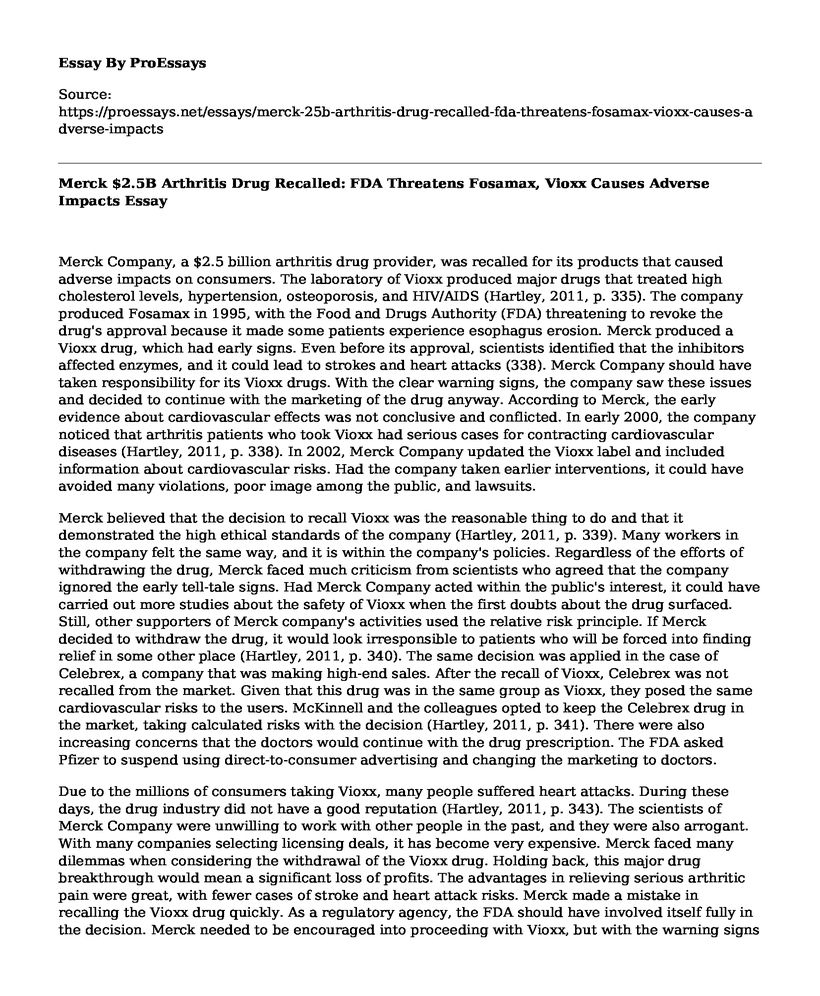Merck Company, a $2.5 billion arthritis drug provider, was recalled for its products that caused adverse impacts on consumers. The laboratory of Vioxx produced major drugs that treated high cholesterol levels, hypertension, osteoporosis, and HIV/AIDS (Hartley, 2011, p. 335). The company produced Fosamax in 1995, with the Food and Drugs Authority (FDA) threatening to revoke the drug's approval because it made some patients experience esophagus erosion. Merck produced a Vioxx drug, which had early signs. Even before its approval, scientists identified that the inhibitors affected enzymes, and it could lead to strokes and heart attacks (338). Merck Company should have taken responsibility for its Vioxx drugs. With the clear warning signs, the company saw these issues and decided to continue with the marketing of the drug anyway. According to Merck, the early evidence about cardiovascular effects was not conclusive and conflicted. In early 2000, the company noticed that arthritis patients who took Vioxx had serious cases for contracting cardiovascular diseases (Hartley, 2011, p. 338). In 2002, Merck Company updated the Vioxx label and included information about cardiovascular risks. Had the company taken earlier interventions, it could have avoided many violations, poor image among the public, and lawsuits.
Merck believed that the decision to recall Vioxx was the reasonable thing to do and that it demonstrated the high ethical standards of the company (Hartley, 2011, p. 339). Many workers in the company felt the same way, and it is within the company's policies. Regardless of the efforts of withdrawing the drug, Merck faced much criticism from scientists who agreed that the company ignored the early tell-tale signs. Had Merck Company acted within the public's interest, it could have carried out more studies about the safety of Vioxx when the first doubts about the drug surfaced. Still, other supporters of Merck company's activities used the relative risk principle. If Merck decided to withdraw the drug, it would look irresponsible to patients who will be forced into finding relief in some other place (Hartley, 2011, p. 340). The same decision was applied in the case of Celebrex, a company that was making high-end sales. After the recall of Vioxx, Celebrex was not recalled from the market. Given that this drug was in the same group as Vioxx, they posed the same cardiovascular risks to the users. McKinnell and the colleagues opted to keep the Celebrex drug in the market, taking calculated risks with the decision (Hartley, 2011, p. 341). There were also increasing concerns that the doctors would continue with the drug prescription. The FDA asked Pfizer to suspend using direct-to-consumer advertising and changing the marketing to doctors.
Due to the millions of consumers taking Vioxx, many people suffered heart attacks. During these days, the drug industry did not have a good reputation (Hartley, 2011, p. 343). The scientists of Merck Company were unwilling to work with other people in the past, and they were also arrogant. With many companies selecting licensing deals, it has become very expensive. Merck faced many dilemmas when considering the withdrawal of the Vioxx drug. Holding back, this major drug breakthrough would mean a significant loss of profits. The advantages in relieving serious arthritic pain were great, with fewer cases of stroke and heart attack risks. Merck made a mistake in recalling the Vioxx drug quickly. As a regulatory agency, the FDA should have involved itself fully in the decision. Merck needed to be encouraged into proceeding with Vioxx, but with the warning signs well placed. This case study underlines the importance of ethical practices in business. Merck should not only focus on making profits, but also providing the best products that meet the demands and needs of clients. These drugs affected their health conditions, with some having higher risks of cardiovascular diseases.
The case study of Merck Company shows the importance of companies holding the right ethical standards. If the patients and physicians felt that there was a greater cardiovascular risk, they should have stopped using the drug. An option for the patients was accepting the risk and closely monitoring the potential risk factors for every patient. The case study of Merck Company shows the future of pharmaceutical industries. Indeed, pharmaceutical advertising is done in an unregulated environment. This calls for the need of the government to take action in future regulations. Advertising in the future must be toned down, with disclosure of every vital piece of information. The lawsuits against Merck Company claim that it settled on these decisions to reduced potential costs for the company. The right ethical practices in a company are vital in ensuring success and sustainability in the future. Corporate social responsibility (CSR) is an important issue for consideration by pharmaceutical companies. With the right CSR approach, companies realize better productivity and engagement with the environment. There is a need for regulation of the pharmaceutical companies' advertisements, to ensure that they meet the required standard practices. With the right regulations, Merck's company has improved public image and better standardization procedures.
References
Hartley, R. F. (2011). Management mistakes and successes. Hoboken, NJ: Wiley. Retrieved from http://repository.fue.edu.eg/xmlui/bitstream/handle/123456789/3960/7015.pdf?sequence=1
Cite this page
Merck $2.5B Arthritis Drug Recalled: FDA Threatens Fosamax, Vioxx Causes Adverse Impacts. (2023, Feb 23). Retrieved from https://proessays.net/essays/merck-25b-arthritis-drug-recalled-fda-threatens-fosamax-vioxx-causes-adverse-impacts
If you are the original author of this essay and no longer wish to have it published on the ProEssays website, please click below to request its removal:
- Nursing Essay Example - Care Coordination of a Patient
- African Hand Drumming and Health Benefits Essay
- Family Nursing Interventions for Health Promotion - Essay Sample
- Acute Vs. Chronic Asthma Exacerbations - Essay Sample
- Essay Sample on Leadership & Motivation: The Key to Successful Team Performance
- Emotional Intelligence: A Guide for Nurses - Essay Sample
- Essay Example on My Learning Journey: Taking Responsibility & Improving Myself







